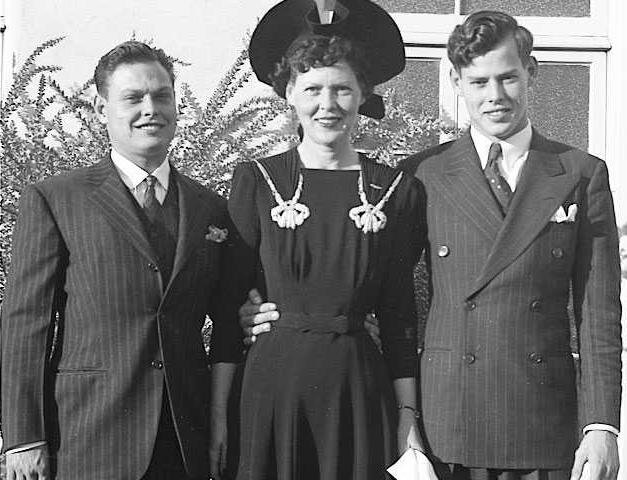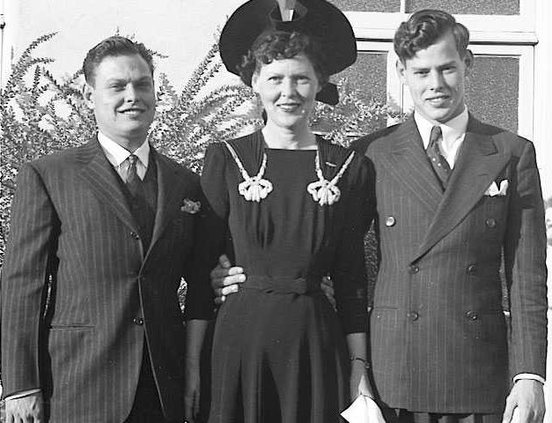There are two framed photographs and one prominent black-and-white poster adorning David Burke’s otherwise spartan office.
On top of the credenza behind his chair is a 5- by 7-inch photograph showing the smiling faces of two young girls. They are the daughters of Burke, Manteca Unified School District’s operations director.
On the wall next to the door, in a spot that is directly in his range of vision while working on his computer, is a custom-framed picture of an older man. Superimposed in front of the man is the image of a military aircraft bomber. On the right side next to the smiling image are two Purple Heart medals.
The caption reads: Earl Burke, 84.
Below it is a short text, the few paragraphs vainly trying to capture the story of the man’s heroism during World War II, a historic highlight that no amount of words could ever convey.
The stark poster on top of the shelves above the credenza is the simple yet powerful advertisement that promoted the powerful seven-part PBS mini-series by Ken Burns on World War II – The War.
The man in the custom frame is Burke’s late father who died of Parkinson’s disease in 2007. The World War II hero was featured prominently in the mini-series. The production took years to finish, but the wartime hero was able to watch the showing of the miniseries on TV just before he died.
Earl Burke was a B-17 gunner in World War II who flew the powerful aircraft on dangerous missions over Germany during the war. He was a gunner on the B-17 Flying Fortress with the 384th Bomb Group. He was just 19 years old. One raid on the city of Schweinfurt, a German manufacturing center, suffered a great loss with 60 allied planes and 600 crewmen lost.
The first Purple Heart was for being wounded by a German shell that hit his left arm when a German shell pierced his turret on the underside of the plane during a raid run. Although wounded, he was determined to continue firing his twin 50-caliber guns after having the presence of mind, thanks to his Eagle Scout training, to tie a tourniquet on his wounded arm to stem the bleeding.
He was awarded the second Purple Heart after sustaining another injury in a bomb explosion on the ground after the raid on Schweinfurt. He was sent back to the United States as a result of that second injury.
One of the most touching, if not heart-wrenching vignettes in Earl Burke’s television interview was the death of his older and only brother in 1942. Tom Burke was in an Army Air Forces mission in Puerto Rico in 1942. His younger brother was about to graduate in high school when the family received a Western Union Telegram.
“THE SECRETARY OF WAR DESIRES ME TO EXPRESS HIS DEEP REGRET THAT YOUR SON TECHNICIAN FOURTH GRADE THOMAS F BURKE JR DIED OCTOBER 3 IN PUERTORICO AS RESULT OF AIRPLANE CRASH PERIOD. NO REMAINS CAN BE TRANSPORTED TO UNITED STATES UNTIL AFTER TERMINATION OF HOSTILITIES….,” the telegram read in part.
Ironically, his parents already read about the incident in the local paper before the telegram arrived.
A few weeks after his graduation, Earl Burke, inspired by his only sibling’s heroism, enlisted in the Army to serve in the war effort.
David Burke said he has the original copy of that yellowed telegram.
After the war, his father married the former Lois Marie Dudley in 1946 with whom he had three sons. As a civilian, he held a number of jobs including being a lecturer at California State University in Sacramento and working at the Lockheed Missiles and Space Company where he retired in 1985.
David Burke said his father never met Ken Burns in person while he was working on the mini-series. But when the noted TV documentary giant was in Sacramento promoting the start of the television show, David Burke said he asked Burns if he could talk to his father on the telephone. His father was already sick at that time. Burns agreed to the request. When his father answered the phone and Burns indentified himself, Burke said his father thought it was all a joke. It’s a story that Burke remembers fondly to this day.
Recalling his dad in PBS mini-series on World War II





